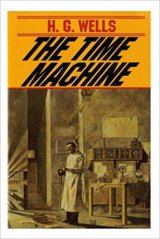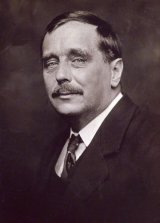The Time Machine Page #11
The Time Machine is a science fiction novella by H. G. Wells, published in 1895 and written as a frame narrative. The work is generally credited with the popularization of the concept of time travel by using a vehicle or device to travel purposely and selectively forward or backward through time.
“I saw the heads of two orange-clad people coming through the bushes and under some blossom-covered apple-trees towards me. I turned smiling to them, and beckoned them to me. They came, and then, pointing to the bronze pedestal, I tried to intimate my wish to open it. But at my first gesture towards this they behaved very oddly. I don’t know how to convey their expression to you. Suppose you were to use a grossly improper gesture to a delicate-minded woman—it is how she would look. They went off as if they had received the last possible insult. I tried a sweet-looking little chap in white next, with exactly the same result. Somehow, his manner made me feel ashamed of myself. But, as you know, I wanted the Time Machine, and I tried him once more. As he turned off, like the others, my temper got the better of me. In three strides I was after him, had him by the loose part of his robe round the neck, and began dragging him towards the sphinx. Then I saw the horror and repugnance of his face, and all of a sudden I let him go. “But I was not beaten yet. I banged with my fist at the bronze panels. I thought I heard something stir inside—to be explicit, I thought I heard a sound like a chuckle—but I must have been mistaken. Then I got a big pebble from the river, and came and hammered till I had flattened a coil in the decorations, and the verdigris came off in powdery flakes. The delicate little people must have heard me hammering in gusty outbreaks a mile away on either hand, but nothing came of it. I saw a crowd of them upon the slopes, looking furtively at me. At last, hot and tired, I sat down to watch the place. But I was too restless to watch long; I am too Occidental for a long vigil. I could work at a problem for years, but to wait inactive for twenty-four hours—that is another matter. “I got up after a time, and began walking aimlessly through the bushes towards the hill again. ‘Patience,’ said I to myself. ‘If you want your machine again you must leave that sphinx alone. If they mean to take your machine away, it’s little good your wrecking their bronze panels, and if they don’t, you will get it back as soon as you can ask for it. To sit among all those unknown things before a puzzle like that is hopeless. That way lies monomania. Face this world. Learn its ways, watch it, be careful of too hasty guesses at its meaning. In the end you will find clues to it all.’ Then suddenly the humour of the situation came into my mind: the thought of the years I had spent in study and toil to get into the future age, and now my passion of anxiety to get out of it. I had made myself the most complicated and the most hopeless trap that ever a man devised. Although it was at my own expense, I could not help myself. I laughed aloud. “Going through the big palace, it seemed to me that the little people avoided me. It may have been my fancy, or it may have had something to do with my hammering at the gates of bronze. Yet I felt tolerably sure of the avoidance. I was careful, however, to show no concern and to abstain from any pursuit of them, and in the course of a day or two things got back to the old footing. I made what progress I could in the language, and in addition I pushed my explorations here and there. Either I missed some subtle point or their language was excessively simple—almost exclusively composed of concrete substantives and verbs. There seemed to be few, if any, abstract terms, or little use of figurative language. Their sentences were usually simple and of two words, and I failed to convey or understand any but the simplest propositions. I determined to put the thought of my Time Machine and the mystery of the bronze doors under the sphinx, as much as possible in a corner of memory, until my growing knowledge would lead me back to them in a natural way. Yet a certain feeling, you may understand, tethered me in a circle of a few miles round the point of my arrival. VIII Explanation “So far as I could see, all the world displayed the same exuberant richness as the Thames valley. From every hill I climbed I saw the same abundance of splendid buildings, endlessly varied in material and style, the same clustering thickets of evergreens, the same blossom-laden trees and tree ferns. Here and there water shone like silver, and beyond, the land rose into blue undulating hills, and so faded into the serenity of the sky. A peculiar feature, which presently attracted my attention, was the presence of certain circular wells, several, as it seemed to me, of a very great depth. One lay by the path up the hill which I had followed during my first walk. Like the others, it was rimmed with bronze, curiously wrought, and protected by a little cupola from the rain. Sitting by the side of these wells, and peering down into the shafted darkness, I could see no gleam of water, nor could I start any reflection with a lighted match. But in all of them I heard a certain sound: a thud—thud—thud, like the beating of some big engine; and I discovered, from the flaring of my matches, that a steady current of air set down the shafts. Further, I threw a scrap of paper into the throat of one, and, instead of fluttering slowly down, it was at once sucked swiftly out of sight. “After a time, too, I came to connect these wells with tall towers standing here and there upon the slopes; for above them there was often just such a flicker in the air as one sees on a hot day above a sun-scorched beach. Putting things together, I reached a strong suggestion of an extensive system of subterranean ventilation, whose true import it was difficult to imagine. I was at first inclined to associate it with the sanitary apparatus of these people. It was an obvious conclusion, but it was absolutely wrong. “And here I must admit that I learnt very little of drains and bells and modes of conveyance, and the like conveniences, during my time in this real future. In some of these visions of Utopias and coming times which I have read, there is a vast amount of detail about building, and social arrangements, and so forth. But while such details are easy enough to obtain when the whole world is contained in one’s imagination, they are altogether inaccessible to a real traveller amid such realities as I found here. Conceive the tale of London which a negro, fresh from Central Africa, would take back to his tribe! What would he know of railway companies, of social movements, of telephone and telegraph wires, of the Parcels Delivery Company, and postal orders and the like? Yet we, at least, should be willing enough to explain these things to him! And even of what he knew, how much could he make his untravelled friend either apprehend or believe? Then, think how narrow the gap between a negro and a white man of our own times, and how wide the interval between myself and these of the Golden Age! I was sensible of much which was unseen, and which contributed to my comfort; but save for a general impression of automatic organisation, I fear I can convey very little of the difference to your mind.
Translation
Translate and read this book in other languages:
Select another language:
- - Select -
- 简体中文 (Chinese - Simplified)
- 繁體中文 (Chinese - Traditional)
- Español (Spanish)
- Esperanto (Esperanto)
- 日本語 (Japanese)
- Português (Portuguese)
- Deutsch (German)
- العربية (Arabic)
- Français (French)
- Русский (Russian)
- ಕನ್ನಡ (Kannada)
- 한국어 (Korean)
- עברית (Hebrew)
- Gaeilge (Irish)
- Українська (Ukrainian)
- اردو (Urdu)
- Magyar (Hungarian)
- मानक हिन्दी (Hindi)
- Indonesia (Indonesian)
- Italiano (Italian)
- தமிழ் (Tamil)
- Türkçe (Turkish)
- తెలుగు (Telugu)
- ภาษาไทย (Thai)
- Tiếng Việt (Vietnamese)
- Čeština (Czech)
- Polski (Polish)
- Bahasa Indonesia (Indonesian)
- Românește (Romanian)
- Nederlands (Dutch)
- Ελληνικά (Greek)
- Latinum (Latin)
- Svenska (Swedish)
- Dansk (Danish)
- Suomi (Finnish)
- فارسی (Persian)
- ייִדיש (Yiddish)
- հայերեն (Armenian)
- Norsk (Norwegian)
- English (English)
Citation
Use the citation below to add this book to your bibliography:
Style:MLAChicagoAPA
"The Time Machine Books." Literature.com. STANDS4 LLC, 2025. Web. 22 Jan. 2025. <https://www.literature.com/book/the_time_machine_159>.




Discuss this The Time Machine book with the community:
Report Comment
We're doing our best to make sure our content is useful, accurate and safe.
If by any chance you spot an inappropriate comment while navigating through our website please use this form to let us know, and we'll take care of it shortly.
Attachment
You need to be logged in to favorite.
Log In